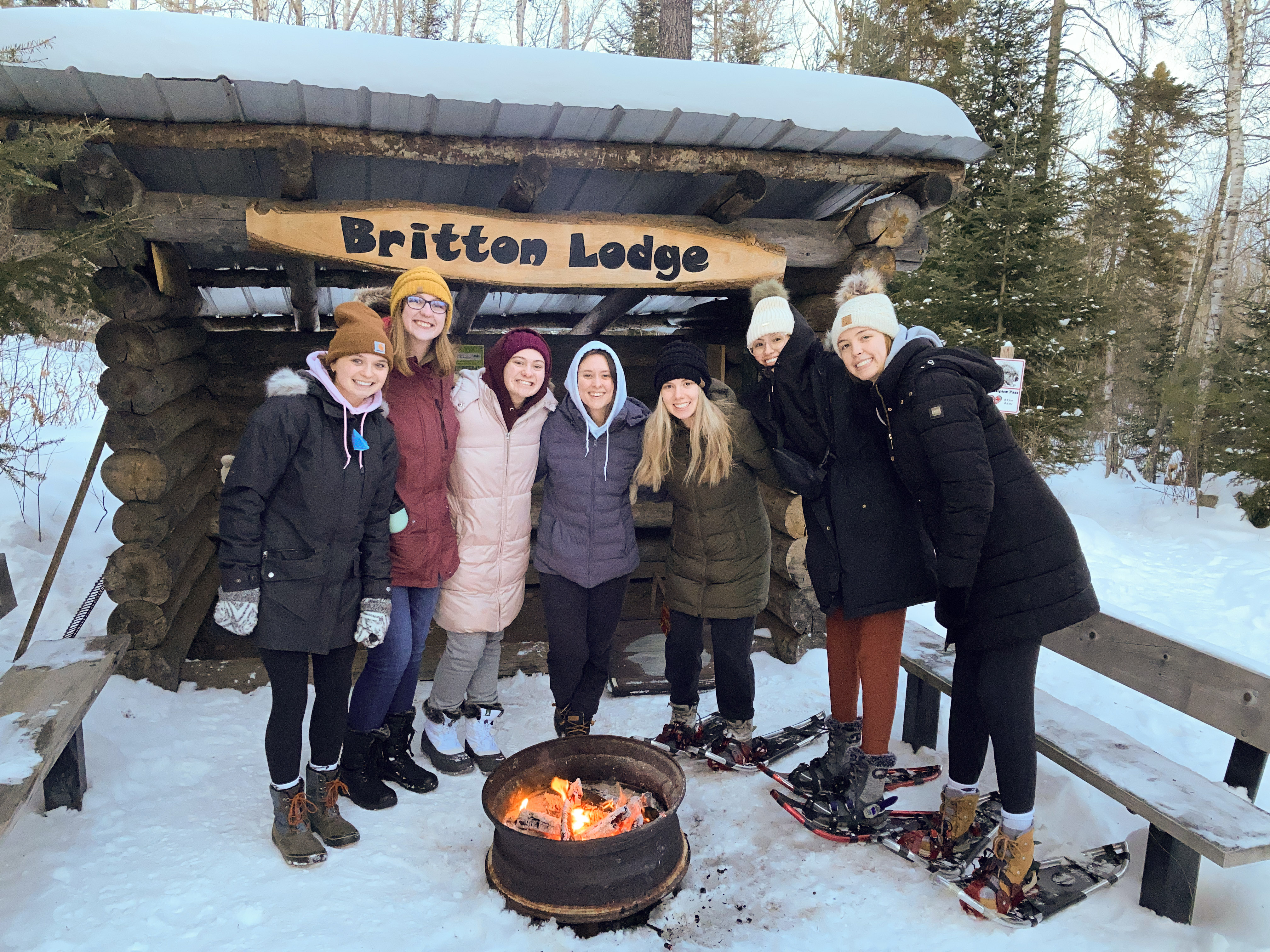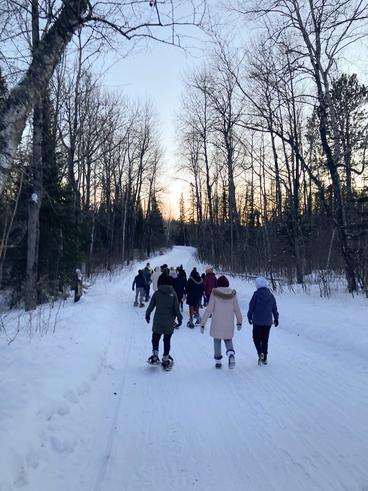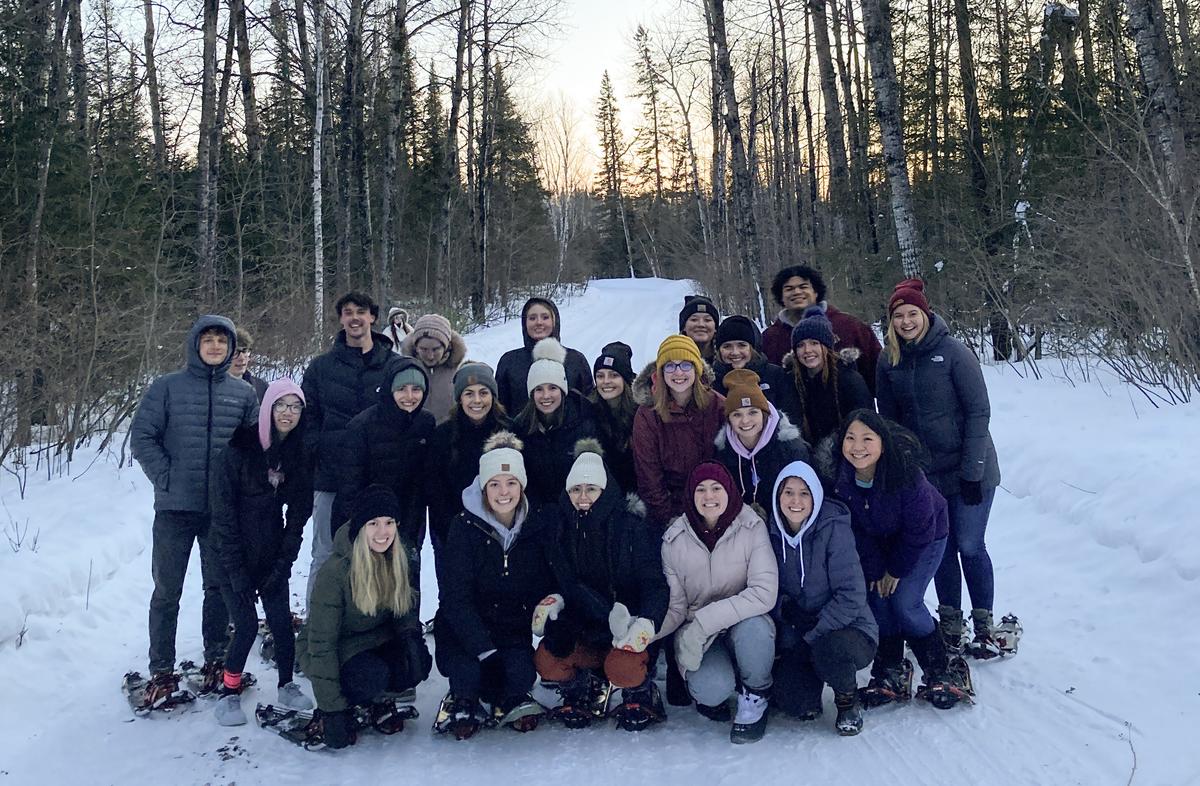Early this spring, a class of UMD students on the path to becoming teachers donned snowshoes, many for the first time, as they set out on the forested trails at Boulder Lake.
Heading into the woods is an unconventional way to learn about children’s literature. But it made a lasting impression on students in the Integrated Elementary and Special Education (IESE) program.
“Children's Literature in the Elementary School” is a foundation course in IESE that aims to broaden student understanding of the concept of literacy, according to Assistant Professor Suki Mozenter who teaches the class.
Mozenter asserts that text isn’t just found in books. “We look at different types of literacies and notions of what it means to read or be a reader. We look at texts that represent a diversity of experiences,” she explains. “You can read interactions. You can read a landscape. There are lots of ways to sensemaking.”
This is the first of three literacy courses IESE students will take. “It lays the groundwork for students to have a justice oriented and inclusive notion of readers and literacy,” says Mozenter.
Expanding the Boundaries of the Classroom
When Mozenter first visited the Boulder Lake Environmental Learning Resource Center (BLELC) she says she was struck by its potential for expanding the notion of what a classroom is and its capacity to ground teaching and learning in place.
The BLELC is one of UMD’s underutilized resources. It includes expansive acreage, an indoor classroom and knowledgeable instructors. Groups that visit the BLELC typically focus on environmental research and education. But Director Ryan Hueffmeier takes pride in being able to offer tailored learning opportunities at the BLELC. “We have an 18,000-acre classroom. We love to get all kinds of groups out to Boulder and to meet teachers and students where they’re at,” he says.
Hueffmeier admits that hosting a children’s literature class was a first for the center but was enthusiastic about the challenge. He and Mozenter collaborated to come up with unique and memorable and meaningful learning experiences for her class. The fall children’s literature class visited twice and the spring class visited once.

Student Reflecting and Learning
The spring visit included a guided snowshoe hike with Caleb Weiers, a UMD alum and BLELC staff member. Weiers talked about reading the landscape and pointed out visual evidence of wildlife like hares and beavers through tracks and markings.
After the hike, students sat around a fire and reflected on what they learned. Mozenter observed students having “aha expansive moments” that influenced their thinking about reading and literacy. “It’s a big conceptual shift, which is much easier to make when embedded in an experience like this rather than just talking about concepts in the classroom,” she says.

Expanding student understanding in this way can have an important impact on their future teaching, according to Mozenter. It could help them to understand and assist students who are struggling to read and prevent their further marginalization.
Student Julia Velky appreciated the outdoor outing. “Every student learns differently so being able to get out of the classroom and move and learn in nature helps us to get our attention and motivation,” she says. “I think all professors if they can, should take their classes out to get moving. Even if it is just for a walk around campus or a trip to boulder lake. It makes the class memorable and helps spark new ideas of tactics we can use in the classroom.”
Sydney Ruiz, another student in the class, admits that she was skeptical at first about the idea of taking a trip to Boulder Lake and whether it would offer educational value. But afterward, she offers this glowing testimonial. “I learned that literature and reading do not only take place in words on a page. Reading can take many different forms, including reading your surroundings. The calming setting allowed for a different kind of thinking to take place. I would love to go back to Boulder Lake for another field trip, I loved the experience!”
Besides learning about literacy, Mozenter notes that getting outside and having a bit of a break from their normal routine was beneficial for her students, who have reported being under lots of stress this year as the pandemic continues.
In addition, students build relationships on these trips outside the classroom. Because IESE students go through the program in a cohort, this is especially useful. “Collegiality is an important part of being a teacher,” says Mozenter. “An experience like this can help students to shift and be more collaborative and have a stronger sense of community.”
